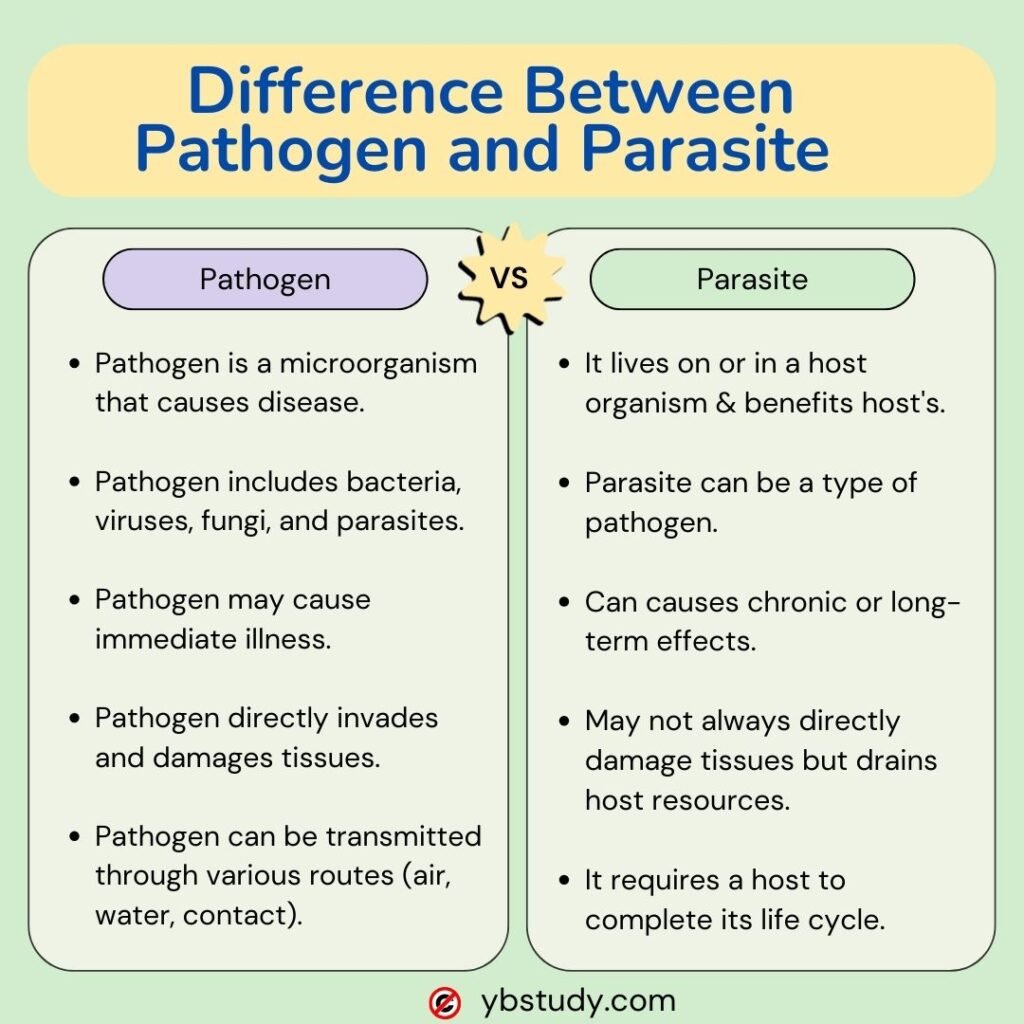5 key Difference Between Pathogen and Parasite PDF
In this article we are going to discuss about what is pathogen, what is parasite and the Difference Between pathogen and Parasite. Generally, pathogens and parasites are kind of microorganisms that can harm to the host organisms, but there are some important differences between pathogen and parasite.
Pathogens are the kind of microorganisms that cause diseases, such as bacteria, viruses, fungi, and protozoa. These spread fungal infections in the host’s body and weaken the host’s immune system.
On the other hand, parasites are organisms that depend on the host organism for life cycle, such as insects and lice. They take nutrition and protection from their host organisms and sometimes they even destroy or kill the host’s organisms.
Both pathogens and parasites can be harmful to the host, but parasites have a more complex life cycle and can remain associated with the host for a longer period.
What is the Difference Between Pathogen and Parasite?
| Pathogen | Parasite |
|---|---|
| A pathogen is an organism or agent that causes disease in its host. | A parasite is an organism that lives on or in a host organism and depends on it for survival, often causing harm or disease. |
| Pathogens include viruses, bacteria, fungi, and other infectious agents. | Parasites can be protozoa, helminths (worms), or arthropods like ticks and lice. |
| Pathogens typically do not require a host to complete its life cycle. | Parasites will have to depend on their host to complete their life cycle. |
| They spread through various means such as air, water, or direct contact with infected individuals. | Parasites typically live within or on the host, acquiring nutrients at the host’s expense. |
| Examples include influenza virus, Salmonella bacteria, and malaria parasites. | Examples include malaria parasites, tapeworms, and fleas. |
| Pathogens cause diseases like flu, gastroenteritis, and pneumonia. | Parasites cause conditions such as malaria, intestinal worms, and scabies. |
Read: 5 key Difference Between Antigen and Pathogen
5 Key Difference Between Pathogen and Parasite PDF Image
- A parasite is an organism that lives on or in another organism at the expense of the host’s body, while a pathogen is a disease-causing agent.
- Most parasites are prokaryotic organisms, except fungi, while all pathogens are eukaryotic organisms.
- Not all parasites are disease-causing agents, while all pathogens cause disease in hosts.
- Parasites cause diseases like amoebic dysentery and malaria while pathogens cause diseases like food poisoning, flu, AIDS, etc.
- Some plants are also parasites, but pathogens are always microorganisms.
Read: 5 Key Difference Between Plants and Trees

Read: 5 Key Difference Between Brain and Spinal Cord
What is a pathogen in simple words?
A pathogen is a bacterium, virus, parasite, or fungus that can cause disease within the body.
Read: Explore the Differences Between Backbone and Spinal Cord?
What does parasite mean?
A parasite is a lower eukaryotic organism that is pathogenic and can act as a pathogen or a vector to spread disease . Parasites are any organism that obtains nutrients or shelter required for its survival, development or reproduction within or outside the host. Many small animals survive as parasites, attaching themselves to larger animals.
